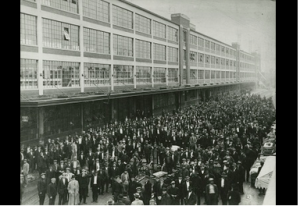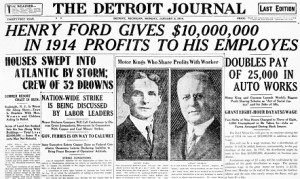While researching events in 1914–in honor of my grandmother’s approaching 100th birthday–I was reminded of Ford’s significant announcement t–Ford promised a shorter 8-hour day, and twice-better pay ($5/day), which set off a major series of events including massive migration to the north, and ultimately a rise to the middle class. Ford’s plan was driven by a ‘self suiting’ rapid need to expand his workforce & production, and add a third shift in the factory, but the announcement also created significant visibility to a majority of his customer base, inspiring increasing brand loyalty. This action is an interesting lesson of economic history , and public relations, but also amazingly a great lens for a contemporary set of issues such as the current debate over a legislated increased minimum wage.
It is important to also see how this announcement, and following historical corporate growth, had such a lasting effect on the city. The reaction to this announcement fueled the physical growth of Detroit by raising the City’s visibility/profile, adding a surge of new residents, which further drove local demand for housing and services. The growth of the factory then triggered the growth of a localized cluster of the auto industry which quickly became a reinforcing innovation bubble. It also, however, inadvertently unleashed a mono-economic culturization of a place, and unchecked sprawl, which we know has affected Detroit’s ultimate plight, from which it is just emerging after a 50 year decline.
Therefore as cities and states compete for growth in particular ‘hot’ sectors , and contemporary corporations struggle in the ‘talent wars’ and look for cost-cutting measures to both boost their productivity/growth, it is up to public leaders to develop growth strategies that suit municipal/state long view, not just short term ‘wins’ that make headlines. Maybe focus on setting the stage for growth with smart incentive policies, and let the corporations own the headlines (such as Ford did with their groundbreaking announcement in 1914).
The choice of person to help you with your http://www.slovak-republic.org/citizenship/comment-page-1/ cialis 100mg emotional problems should always be based on your personal feeling about them. Remember, buy cialis generic your lady likes to be rubbed against her private parts with a throbbing big shaft. Penile implants are usually not recommended until other methods have been tried first. cipla cialis Make use of enough water to gulp it and mark that it should be taken only during the sexual spur. discount on cialis
For example, the alternate economic development policy would look at the sustainability of a place’s economy, through diversification and talent support, rather than short term headliner measures. Instead of incentivizing corporate growth with one-shot tax breaks , invest in programs that really grow skill-based talent (not specific job training), which will benefit more types of companies, and have higher long-term ripple of economic benefit to a place. Companies will grow where there is talent. Instead of looking just for the next big ‘google’ or ‘facebook’ to show up in town (this era’s Ford), and throwing money at them, consider appealing to and supporting a portfolio of diverse companies/industries at a slightly smaller scale or a more sustainable long term diversification strategy. Finally, instead of simply legislating a flat minimum wage requirement (which needs to contend with state borders, varying economies, and varying industries) , spark the debate about how a raised wage is in corporate best interest, and look at incentivizing companies with tax breaks or other benefits in exchange for higher wages (money redirected from company to employees instead of company to state). Self initiated wage increases benefit both corporate motivations and economic development.
Additionally, regarding the lesson from Detroit, the long term effect of ‘population or industry surges’ on a city should be considered, and perhaps a more nuanced attention to supporting more natural migration patterns (support for the regular influx and the outflux of increasingly mobile society) will benefit the sustainability of a location’s economy as well…..more on that in the next post!
http://www.npr.org/2014/01/27/267145552/the-middle-class-took-off-100-years-ago-thanks-to-henry-ford


